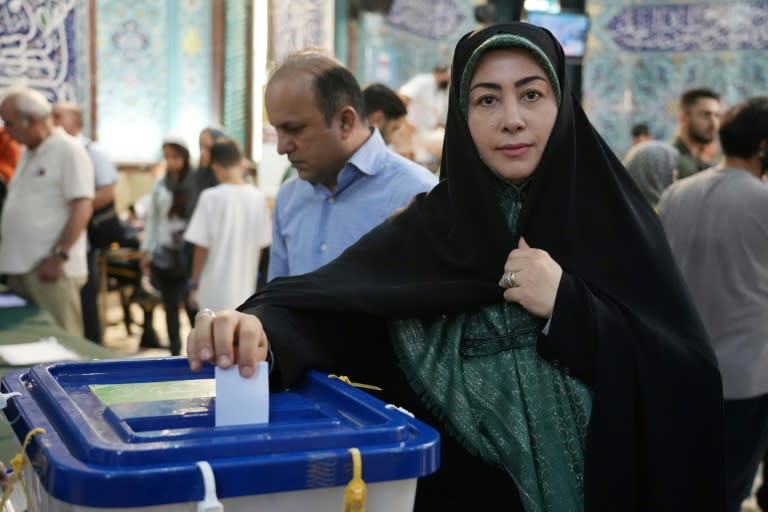In Tehran, hopeful Iranians vote for new president as others boycott

At a polling station in central Tehran, Iranian voters formed a long line to cast their ballots for a new president, while others sat in a nearby park, shunning a process they have lost faith in.
Friday's snap elections, originally slated for 2025, were brought forward following the unexpected death of ultraconservative president Ebrahim Raisi in a helicopter crash last month.
The vote takes place as Iran grapples with the economic impact of international sanctions amid heightened regional tensions over the Gaza war between Israel and Tehran's ally Hamas.
Contenders include the lone reformist Masoud Pezeshkian and three conservative figures: Mohammad Bagher Ghalibaf, Saeed Jalili and Mostafa Pourmohammadi.
Mitra, a 47-year-old housewife who asked that only her first name be used, said she would vote for the reformist candidate so her daughter could "walk the streets without worries".
"Pezeshkian promised to bring an end to the morality police" in charge of enforcing a strict dress code on women, she said outside Tehran's Ershad mosque.
Women in Iran have had to observe dress code which includes covering the head and the neck since shortly after the 1979 Islamic revolution.
- 'Honest' candidate -
The issue has become particularly contentious following a wave of mass protests triggered by the 2022 death in custody of Mahsa Amini, an Iranian Kurd who had been allegedly arrested for violating the dress code.
"I don't think he (Pezeshkian) can do much" to change the situation, said Mitra, but she asserted that "not voting is not particularly useful".
Earlier on Friday, Iran's supreme leader Ayatollah Ali Khamenei who wields ultimate authority urged "high participation" at the ballots.
In the 2021 election that brought Raisi to power, voters shunned the polls after many reformists and moderates were disqualified.
The turnout then was just under 49 percent -- the lowest in any presidential election in Iran.
Assad, a 70-year-old retired man, also hailed the 69-year-old Pezeshkian as an "honest" candidate who "has not made extravagant promises, unlike the others."
He said he hopes the reformist candidate would bring an end to internet restrictions imposed in Iran over the years, impeding access to popular social media platforms.
"My son lives in Canada, and I have trouble talking to him and my grandchildren on WhatsApp and Telegram because these apps are blocked," said Assad, who did not give his last name.
"The country faces many problems."
Sixty-six-year-old Masumeh meanwhile said she was voting for ultraconservative former nuclear negotiator Saeed Jalili.
"Thank God it is very crowded, everyone has come, veterans, mothers of martyrs, old and young," she told AFP from the shrine of Shah Abdolazim in southern Tehran, where she had lined up.
- Disillusionment -
Across from Ershad mosque, many Iranians opted against voting and instead sat enjoying the shade in Shariati Park.
Hossein, a 45-year-old electrician, said he had voted in every past election in Iran but would not cast his ballot this time as he believes it "has little impact".
"I have no candidate to vote for and I will not participate in any election from now on," he said, while watching his child play in the park.
"The system cannot be reformed, regardless of whether a reformist or a conservative comes to power," he added, also only giving his first name.
He expressed frustration at the breakdown of the 2015 landmark nuclear deal that Iran negotiated with the United States and other world powers.
The accord, which was meant to curb Iran's nuclear activity in return for sanctions relief, fell through after Washington unilaterally withdrew from it in 2018.
"It's ridiculous that we've been trying to resolve the nuclear issue for 25 years and still haven't reached a conclusion," said Hossein.
"How is that possible?"
Similarly, Pedram, a 50-year-old civil servant, said voting has done little to improve conditions in Iran.
"It has made the situation worse," he said, asking that he be identified solely by his first name, while sitting with his two children in the park.
"If people don't participate in several elections, something will eventually change."
ap/mz/ysm/jsa

 Yahoo News
Yahoo News 
